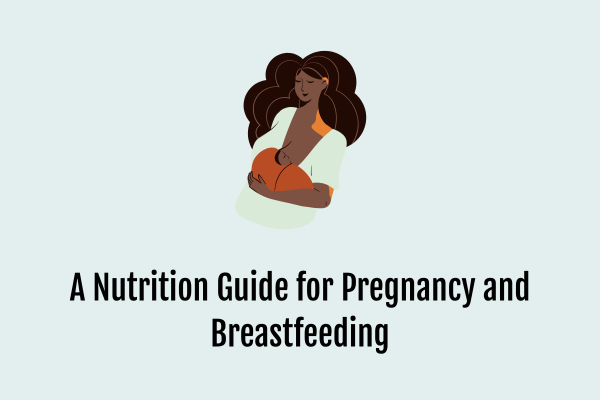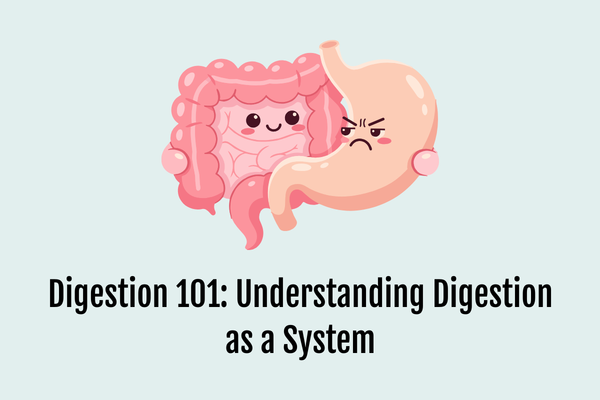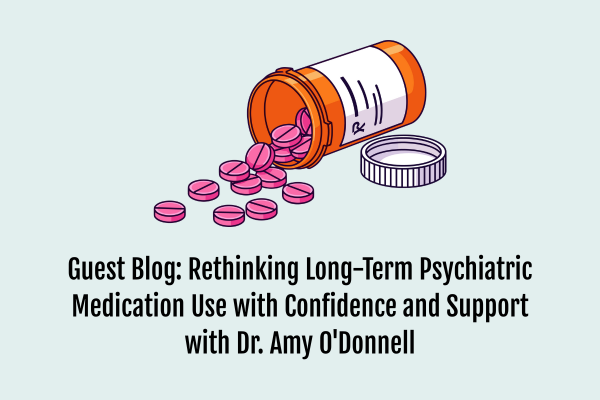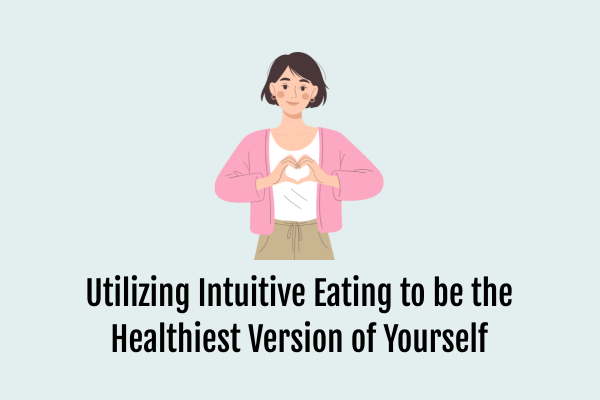A Nutrition Guide for Pregnancy and Breastfeeding
Written by: Sophia Schweiger
Reviewed by: Devon Epitropoulos (Kroesche), MS, RDN, LDN
If you’re expecting—or navigating life with a newborn—you’ve probably heard how important nutrition is during pregnancy and breastfeeding. Whether you’re in your first trimester or your baby is a few months old, good nutrition can help you feel better, support your baby’s development, and reduce your risk of complications.
In this guide, we’ll explore:
- Which nutrients are most important during pregnancy and breastfeeding
- How to plan meals that meet your unique needs
- Tips for navigating meal prep and food aversions
- The power of personalized nutrition
- How to support energy, immunity, and healing postpartum
Why Nutrition Matters in Pregnancy and Breastfeeding
Growing a human being is a big deal. Your body is working overtime to build tissues, form organs, and nourish a rapidly developing baby. After birth, those demands don’t stop—breastfeeding increases your need for calories, fluids, and micronutrients to support milk production and recovery.
Without enough of the right foods, you may feel:
- Exhausted or weak
- More prone to infections
- Anxious or moody
- Low on milk supply (if breastfeeding)
Proper nutrition is about more than weight gain—it’s about feeling well, healing efficiently, and giving your baby the best start possible.
Key Nutrients for Pregnancy (and Where to Find Them)
Here are some essential nutrients you’ll want to prioritize during pregnancy—and some dietitian-approved food sources for each:
1. Folate (Folic Acid)
- Why it matters: Critical for preventing neural tube defects
- Best sources: Lentils, spinach, asparagus, oranges, fortified cereals
- Daily goal: 600–800 mcg/day during pregnancy
2. Iron
- Why it matters: Supports increased blood volume and prevents anemia
- Best sources: Lean red meat, lentils, tofu, spinach, fortified cereals
- Daily goal: 27 mg/day
- Dietitian tip: Pair with vitamin C-rich foods (like bell peppers or citrus) for better absorption
3. Calcium
- Why it matters: Builds strong bones and teeth for baby
- Best sources: Dairy, fortified plant milks, broccoli, almonds, leafy greens
- Daily goal: 1,000 mg/day
4. DHA (Omega-3 Fatty Acids)
- Why it matters: Supports brain and eye development
- Best sources: Fatty fish (like salmon), eggs, chia seeds, algae-based supplements
- Pro tip: Aim for 200–300 mg of DHA daily
5. Choline
- Why it matters: Essential for brain development and placenta function
- Best sources: Eggs (especially yolks), meats, soybeans, Brussels sprouts
- Daily goal: 450 mg/day
6. Protein
- Why it matters: Needed for cell growth and tissue repair
- Best sources: Poultry, fish, legumes, Greek yogurt, eggs, tofu
- Target: Around 75–100 grams per day (varies by trimester and individual needs)
7. Fiber
- Why it matters: Reduces constipation, balances blood sugar
- Best sources: Whole grains, beans, fruits, vegetables, seeds
- Goal: 25–30 grams per day
Breastfeeding Nutrition: Keeping Up with Demand
Once baby arrives, your nutrient needs remain high. Producing breast milk requires about 400–500 extra calories per day, depending on your milk supply and activity level.
Nutrients to Prioritize While Breastfeeding
- Vitamin A: Carrots, sweet potatoes, spinach
- Vitamin D: Fatty fish, fortified foods, sunshine (supplement if needed)
- Iodine: Seaweed, iodized salt, dairy
- Zinc: Beef, chickpeas, cashews
- Fluids: Aim for 10–12 cups per day (include water, herbal teas, milk)
Breastfeeding doesn’t mean “eating for two” again—but it does mean making healthy eating a consistent priority to maintain energy, avoid nutrient depletion, and support your milk production.
Meal Planning During Pregnancy and Postpartum
Pregnancy and postpartum are not the time to overcomplicate your nutrition. In fact, the more prepared and simplified your meals are, the better.
Smart Meal Planning Tips from a Dietitian:
- Build balanced plates using the "½ veggies + ¼ protein + ¼ carbs + healthy fat" model
- Prep staples in bulk like quinoa, roasted veggies, and proteins to mix and match
- Choose easy snacks like string cheese, boiled eggs, trail mix, or hummus with veggies
- Stock your freezer with soups, casseroles, and smoothie packs before baby arrives
- Cook once, eat twice—make enough for leftovers or double-batch for the freezer
Meal planning doesn’t mean rigid diets—it means ensuring nutritious options are within reach when your energy is low or time is tight.
Meal Prep Ideas for Pregnant and Breastfeeding Moms
You don’t need to spend hours in the kitchen to eat well. Here are some easy meal prep ideas you can rotate through your week:
Breakfast Options
- Overnight oats with chia seeds, berries, and nut butter
- Greek yogurt parfaits with fruit and granola
- Veggie and egg muffins
- Smoothies with spinach, banana, protein powder, and flaxseed
Lunches and Dinners
- Sheet pan salmon with roasted sweet potatoes and broccoli
- Lentil soup or chili with whole grain bread
- Chicken stir-fry with brown rice and mixed vegetables
- Quinoa salad with chickpeas, feta, cucumber, and lemon vinaigrette
Snacks
- Trail mix (nuts, seeds, dried fruit)
- Apple slices with peanut butter
- Hard-boiled eggs
- Whole grain crackers with cheese or hummus
When meal prep becomes routine, you’ll have more time for rest, bonding with baby, and recovery.
Personalized Nutrition During Pregnancy and Breastfeeding
Every pregnancy is unique. That’s why personalized nutrition—based on your body, lifestyle, and health history—is essential.
A registered dietitian can help you:
- Adjust calories and macronutrients for each trimester
- Navigate food intolerances or sensitivities
- Address gestational diabetes, nausea, or reflux
- Understand supplement needs and safe dosages
- Create a realistic plan for postpartum weight goals
Working with a professional ensures your plan is backed by science and tailored to you.
Special Considerations for Common Pregnancy Challenges
Morning Sickness
- Eat small, frequent meals
- Keep crackers or dry cereal on hand
- Choose cold or bland foods (sometimes easier to tolerate)
- Ginger tea or candies may help with nausea
- Vitamin B6 supplements (talk to your doctor or dietitian first)
Constipation
- Increase fiber from fruits, veggies, and whole grains
- Drink more fluids
- Move your body with gentle walks or stretching
- Consider magnesium-rich foods (like spinach and pumpkin seeds)
Gestational Diabetes
- Focus on complex carbs with fiber
- Pair carbs with protein and fat
- Avoid sugary drinks and processed snacks
- Monitor blood glucose levels with guidance from your dietitian
Low Milk Supply
- Stay hydrated
- Eat enough total calories (don’t restrict)
- Include galactagogue-rich foods (like oats, fennel, fenugreek)
- Consider a breastfeeding consultation if issues persist
The Role of a Dietitian in Maternal Wellness
There’s a lot of pressure on new and expecting moms to “do it all right.” The truth is, you don’t have to figure everything out alone.
A registered dietitian can be a valuable part of your care team, helping with:
- Nutrition education tailored to each stage
- Meal planning for energy, healing, and milk production
- Supplement guidance to fill in nutritional gaps
- Support for emotional eating or food anxiety
- Coordination with your OB or midwife to ensure a holistic approach
Whether you're planning your pregnancy or already holding your little one, it’s never too late to invest in healthy eating habits that nourish both you and your baby.
Ready for Expert Support on Your Pregnancy Nutrition Journey?
Whether you're prepping for baby or managing the early postpartum chaos, you deserve expert support and practical strategies that work for your life.
Reach out to scheduling@casespecificnutrition.com to connect with a Case Specific Dietitian who can help you create a personalized, nourishing plan for every stage of motherhood. Our team provides individualized nutrition care across the Greater Pittsburgh area, as well as in Erie, Raleigh, and Tampa.
Disclaimer: The information provided in this blog is for educational purposes only and is not intended to diagnose, treat, cure, or prevent any medical condition. This content is not medical advice and should not be used as a substitute for professional medical care. If you have any health concerns or medical conditions, please consult with a qualified healthcare provider before making any changes to your diet or lifestyle.





.webp)

